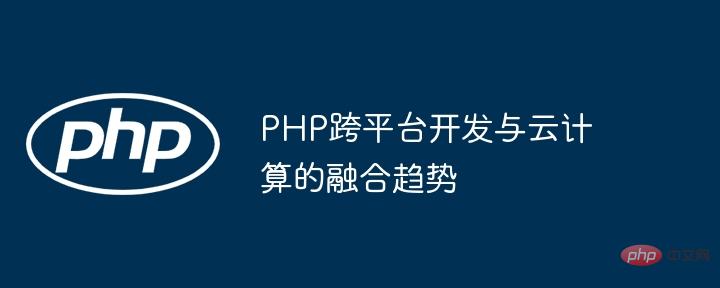Home >Backend Development >PHP Tutorial >The integration trend of PHP cross-platform development and cloud computing
The integration trend of PHP cross-platform development and cloud computing
- PHPzOriginal
- 2024-06-05 16:01:471118browse
Yes, PHP cross-platform development is integrated with cloud computing to provide powerful cross-platform solutions. Benefits include: Cross-platform compatibility: PHP and cloud computing are compatible with multiple operating systems and devices. Elasticity and scalability: Cloud platforms provide scalability and elasticity to handle capacity and traffic peaks. Lower costs: On-demand pricing reduces development and deployment costs. Simplified deployment: Cloud services provide preconfigured environments to simplify deployment and maintenance. Strong ecosystem: The PHP community and cloud platform providers support cross-platform development.

The integration trend of PHP cross-platform development and cloud computing
Introduction
As a flexible and versatile scripting language, PHP is integrating with cloud computing technology to provide a powerful solution for cross-platform development. The elasticity and on-demand scalability of cloud computing infrastructure, combined with the cross-platform nature of PHP, bring numerous benefits to developers.
Integration Advantages
- Cross-platform compatibility: PHP and cloud computing technologies together provide cross-platform compatibility, allowing developers to Create and deploy applications across multiple operating systems and devices such as Windows, macOS, and Linux.
- Elasticity and Scalability: The scalability and elasticity of the cloud platform provide PHP applications with the ability to expand capacity and cope with traffic peaks.
- Reduce costs: The on-demand pricing model offered by cloud computing helps reduce development and deployment costs because developers only pay for the resources they use.
- Simplified deployment: Cloud computing services often provide pre-configured environments that simplify the deployment and maintenance of PHP applications.
- Strong ecosystem: Both the PHP community and cloud platform providers provide a wide range of tools and libraries to support cross-platform development.
Practical case
1. PHP cross-platform application based on AWS
Amazon Web Services (AWS ) is a popular cloud platform that provides a wide range of services to PHP developers. We can use AWS EC2 to create virtual machine instances and use AWS Elastic Beanstalk to quickly deploy and manage PHP applications.
Example code:
// 部署配置
$config = [
'application_name' => 'myapp',
'environment_name' => 'staging',
];
// 部署到AWS Elastic Beanstalk
$deployment = ElasticBeanstalk::factory()->deploy($config);2. Serverless PHP application using Azure Functions
Microsoft Azure Functions is a Serverless computing platform that allows developers to create code that runs on demand. PHP developers can easily create serverless applications using Azure Functions without having to manage any infrastructure.
Example code:
use Microsoft\Azure\Functions\HttpTrigger;
function index(HttpTrigger $trigger) {
return "Hello, world!";
}Conclusion
The integration of PHP cross-platform development and cloud computing provides developers with and powerful solutions for deploying cross-platform applications. By leveraging the benefits of cloud platforms, PHP developers can create applications with cross-platform compatibility, elasticity, scalability, and cost-effectiveness.
The above is the detailed content of The integration trend of PHP cross-platform development and cloud computing. For more information, please follow other related articles on the PHP Chinese website!

